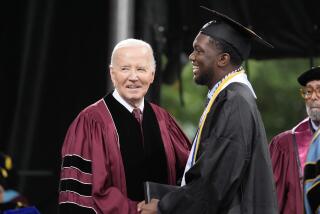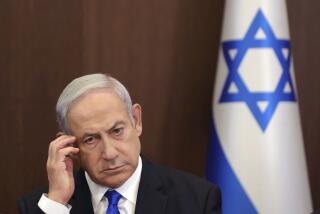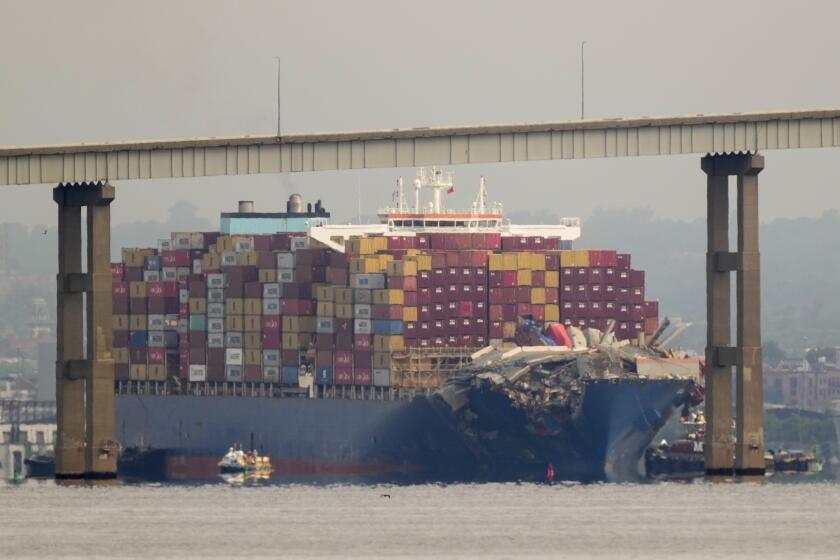Turkish Moderate Becomes Premier
A moderate member of the Islamic-rooted party that won nationwide elections this month was asked Saturday by Turkey’s firmly pro-secular president to form a new government.
Abdullah Gul -- an economist and the second-highest-ranking member of the Justice and Development Party, or AKP, which swept to victory in Nov. 3 polls -- vowed to establish a government swiftly, saying it would tackle Turkey’s multiple problems immediately.
Ensuring that the country is admitted to the European Union and solving the long-running dispute over the divided Mediterranean island of Cyprus would be among his government’s top priorities, Gul said.
“It is time to get down to work. It is time to work day and night and mobilize to solve the problems of our people,” the 52-year-old former banker said.
Gul’s nomination was welcomed by Western diplomats here in the capital, who described him as reliable, pragmatic and a friend of the West.
“He was clearly the best choice. We know and trust him. He speaks our language,” said a senior European diplomat who asked not to be identified.
Turkey is the North Atlantic Treaty Organization’s sole predominantly Muslim member and Israel’s closest regional ally. The country is expected to be a key player in any U.S. military operation to overthrow Iraqi President Saddam Hussein.
Even before his designation as prime minister, Gul reassured Turkey’s Western allies that the country would defer to the views of its pro-Western armed forces on what its contribution should be to a war on its southern neighbor.
Gul’s role, however, is expected to be more one of a caretaker premier until Recep Tayyip Erdogan, the charismatic AKP leader, can take over.
Erdogan, whose popularity helped propel the party to power, is unable to do so now because he was convicted in 1998 of seeking to “stir religious hatred” with a nationalist poem he recited during a rally.
That sentence cost him his job as mayor of Istanbul in 1998, landed him in prison for four months and barred him from running for parliament.
Under Turkish law, only elected lawmakers are eligible for the post of prime minister. However, the new parliament, dominated by the AKP, is expected to push for amendments to the country’s repressive constitution, which was drawn up by the military in 1980 after it seized power for a third time.
“We will overcome legal obstacles to Mr. Erdogan’s premiership,” said Murat Mercan, a senior party official widely expected to become a minister in the new Cabinet.
“It is his right, and that is what the Turkish people expect,” Mercan said Saturday.
Gul suggested that he would be willing to step down in favor of Erdogan. “This situation is abnormal,” he said.
Even though he holds no office, Erdogan remains firmly in control of his party. On Saturday, as Gul was meeting with President Ahmet Necdet Sezer, Erdogan was outlining the AKP’s program at a news conference.
Erdogan too pledged to press ahead with reforms aimed at securing Turkey’s long-cherished goal of joining the European Union, including reducing widespread torture to “zero level.” He promised to crack down on corruption and to make the government more open and accountable. He also pledged to largely abide by a radical fiscal recovery program supported by the International Monetary Fund.
“We are building a new world,” Erdogan said. “And this new world will bring the East and West together in Turkey.”
Western governments and Turkey’s business community have welcomed a single-party government.
The AKP will be the first party to rule without a coalition since 1987, after which a series of shaky coalitions brought the country to the brink of economic collapse. Economic mismanagement and widespread corruption among government officials and the country’s old guard of politicians, none of whom was voted back into parliament, are regarded as the main factors that led to the AKP’s stunning electoral success.
EU leaders are especially hopeful that the AKP will help break the deadlock that has kept Cyprus divided since Turkish troops intervened on the island in 1974 in the wake of a coup by Greek Cypriot ultranationalists aimed at annexing it to Greece.
Erdogan, who was on a daylong visit Saturday to the Turkish-controlled northern third of Cyprus, added to such hopes by saying he endorsed in principle the outlines of a U.N.-brokered peace plan released last week.
Progress on Cyprus would, in turn, increase Turkey’s chances of being given an official date for starting accession talks with the EU when its leaders meet in Copenhagen next month.
Erdogan’s repeated disavowals of the AKP’s Islamic roots have helped ease suspicions among the pro-secular Turkish elite that under the party, the country would move away from the determinedly westward course set by the founder of modern Turkey, Kemal Ataturk.
More to Read
Start your day right
Sign up for Essential California for news, features and recommendations from the L.A. Times and beyond in your inbox six days a week.
You may occasionally receive promotional content from the Los Angeles Times.






